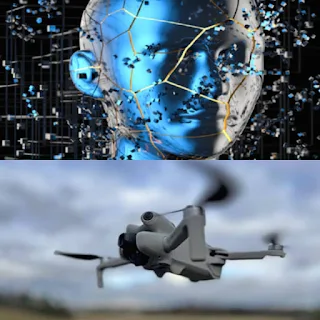"Meta" company revealed Recently, AI chatbots have been introduced, many of which feature celebrity likenesses, or AI versions of celebrities.
This is thanks to Llama 2 technology, which can create "personalities" or "animation" It is based on artificial intelligence based on real people.
Another company called Delphi allows users to create virtual copies of themselves or someone else.
To create a copy of the AI via Delphi, all users need to do is upload some form of identification and up to thousands of files, including emails, chat texts and even YouTube videos.
Experts say it is clear that this technology is quickly taking over the industry, and this is just the beginning.
Michael Puskar, co-founder of AI company NPCx, which is developing its own AI cloning technology in gaming, explains this phenomenon further.
He said in an interview with “The Sun” newspaper: In an email: “Our goal is to allow video game players to clone themselves in video games, and act on their behalf in the game when they are not available to play.”
He pointed out that the NPCx product is called BehaviorX, and it has not been released to the public yet, but it may be pivotal in the development of “Metaverse,” the virtual world technology owned by “Meta.”
The term "metaverse" was popularized. By Meta CEO Mark Zuckerberg, it describes a virtual world that combines social media, cryptocurrencies, augmented reality and gaming.
Puskar added: “Our clones need to exist not only in the video game environment, but also in the metaverse. "Either way, the goal is that when they interact with these clones, they are indistinguishable in every way from the person they were cloned from."
To create clones, NPCx asks players to play and observe them and their environment in great detail.
“We specifically ask them to take certain actions in the game, similar to how actors are asked to take specific actions in motion capture, and this gives us what we need to train our models and create the copy,” Puskar explains.
Puskar added that by creating characters based on real-world people, the company can also create non-playable characters (NPCs) with deep personalities, who act and interact in realistic ways.
When asked about the appeal of AI clones in games, Puskar had a simple answer, saying: “For gamers, playing alongside or against AI clones of real-world players or celebrities adds an element of realism and excitement to the gaming experience. "It's about creating a more engaging, interactive and personal form of entertainment that matches the user's interests and preferences."
Beyond games and chatbots, Puskar expects to see AI cloning technology used in a variety of applications.
“This may include virtual training environments, interactive educational tools, personal digital assistants, and more,” he said. The entertainment industry, in particular, will benefit greatly, with possibilities ranging from in-person movie experiences to virtual concerts featuring digital versions of artists.”
However, while this all sounds like good fun, the ethics around digital cloning are “risky,” Puskar explained.
He explained: "Once your clone is trained, your likeness acts in ways beyond your control. In theory, if the algorithms are working properly, they will behave in ways that you would behave. But we cannot control the opposing party, and you can imagine situations in which an evil person decides to simulate sexual acts with a clone, uses obscene language, or otherwise tries to put them in compromising positions.”
Therefore, it is necessary to ensure that cloned animals are created and used ethically, he added.
Russia launches a new electronic platform to monitor drones and electric scooters
The company responsible for the Russian ERA-GLONASS system announced that it will launch a new system to track the movement of drones and electric scooters.
Regarding the topic, the company's president, Alexei Raikevich, said: " In 2024, our company will launch a new digital platform in Russia to track the movement of drones and electric scooters. This platform will work for the Gostekh service, which is a unified digital platform for public services in Russia.
He added: “Today, we have connected to our platform 250 small aircraft used in agricultural work in the regions of southern Russia, and we provide our services to the operators of these aircraft for free. Thanks to our new system based on ERA-GLONASS systems, we will be able to monitor aircraft movement paths, as well as track the movement of drones in areas where It is prohibited to use drones there, and we will also be able to use the system to monitor the movement of bicycles and electric scooters to control their movement to adhere to the speed limits required in each area.”
Raikevich had also previously indicated that his organization is working on developing a new system based on ERA-GLONASS to search for stolen and lost cars, and it will be launched in 2024.






Good
ReplyDelete